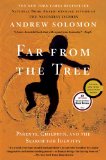Summary | Excerpt | Reading Guide | Reviews | Beyond the Book | Readalikes | Genres & Themes | Author Bio

Critics' Opinion:
Readers' Opinion:
First Published:
Nov 2012, 976 pages
Paperback:
Oct 2013, 976 pages
 Book Reviewed by:
Book Reviewed by:
Morgan Macgregor
Buy This Book
***
In 1993, I was assigned to investigate Deaf culture for the New YorkTimes. My assumption about deafness was that it was a deficit and nothing more. Over the months that followed, I found myself drawn into the Deaf world. Most deaf children are born to hearing parents, and those parents frequently prioritize functioning in the hearing world, expending enormous energy on oral speech and lipreading. Doing so, they can neglect other areas of their children's education. While some deaf people are good at lipreading and produce comprehensible speech, many do not have that skill, and years go by as they sit endlessly with audiologists and speech pathologists instead of learning history and mathematics and philosophy. Many stumble upon Deaf identity in adolescence, and it comes as a great liberation. They move into a world that validates Sign as a language and discover themselves. Some hearing parents accept this powerful new development; others struggle against it.
The whole situation felt arrestingly familiar to me because I am gay. Gay people usually grow up under the purview of straight parents who feel that their children would be better off straight and sometimes torment them by pressing them to conform. Those gay people often discover gay identity in adolescence or afterward, finding great relief there. When I started writing about the deaf, the cochlear implant, which can provide some facsimile of hearing, was a recent innovation. It had been hailed by its progenitors as a miraculous cure for a terrible defect and was deplored by the Deaf community as a genocidal attack on a vibrant community. Both sides have since moderated their rhetoric, but the issue is complicated by the fact that cochlear implants are most effective when they are surgically implanted early — in infants, ideally — so the decision is often made by parents before the child can possibly have or express an informed opinion. Watching the debate, I knew that my own parents would gamely have consented to a parallel early procedure to ensure that I would be straight, had one existed. I do not doubt that the advent of such a thing even now could wipe out most of gay culture. I am saddened by the idea of such a threat, and yet as my understanding of Deaf culture deepened, I realized that the attitudes I had found benighted in my parents resembled my own likely response to producing a deaf child. My first impulse would have been to do whatever I could to fix the abnormality.
Then a friend had a daughter who was a dwarf. She wondered whether she should bring up her daughter to consider herself just like everyone else, only shorter; whether she should make sure her daughter had dwarf role models; or whether she should investigate surgical limb-lengthening. As she narrated her bafflement, I saw a familiar pattern. I had been startled to note my common ground with the Deaf, and now I was identifying with a dwarf; I wondered who else was out there waiting to join our gladsome throng. I thought that if gayness, an identity, could grow out of homosexuality, an illness, and Deafness, an identity, could grow out of deafness, an illness, and if dwarfism as an identity could emerge from an apparent disability, then there must be many other categories in this awkward interstitial territory. It was a radicalizing insight. Having always imagined myself in a fairly slim minority, I suddenly saw that I was in a vast company. Difference unites us. While each of these experiences can isolate those who are affected, together they compose an aggregate of millions whose struggles connect them profoundly. The exceptional is ubiquitous; to be entirely typical is the rare and lonely state.
Excerpted from Far From the Tree: Parents, Children, and the Search for Identity by Andrew Solomon. Copyright 2012 by Andrew Solomon. Excerpted with permission of Scribner, a division of Simon & Schuster, Inc.





The House on Biscayne Bay
by Chanel Cleeton
As death stalks a gothic mansion in Miami, the lives of two women intertwine as the past and present collide.

The Flower Sisters
by Michelle Collins Anderson
From the new Fannie Flagg of the Ozarks, a richly-woven story of family, forgiveness, and reinvention.

The Funeral Cryer by Wenyan Lu
Debut novelist Wenyan Lu brings us this witty yet profound story about one woman's midlife reawakening in contemporary rural China.
Your guide toexceptional books
BookBrowse seeks out and recommends the best in contemporary fiction and nonfiction—books that not only engage and entertain but also deepen our understanding of ourselves and the world around us.